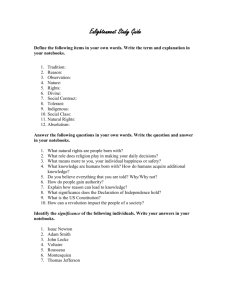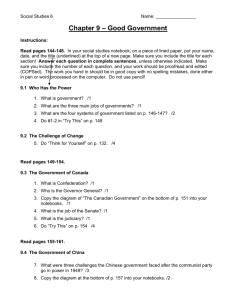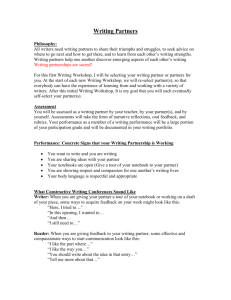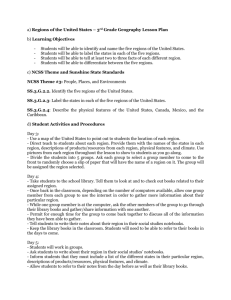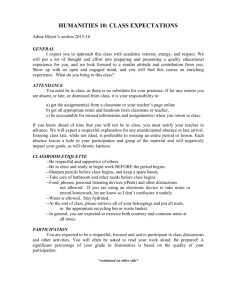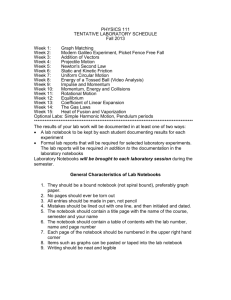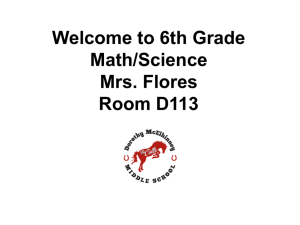Interactive Notebooks: Engaging History Learning
advertisement
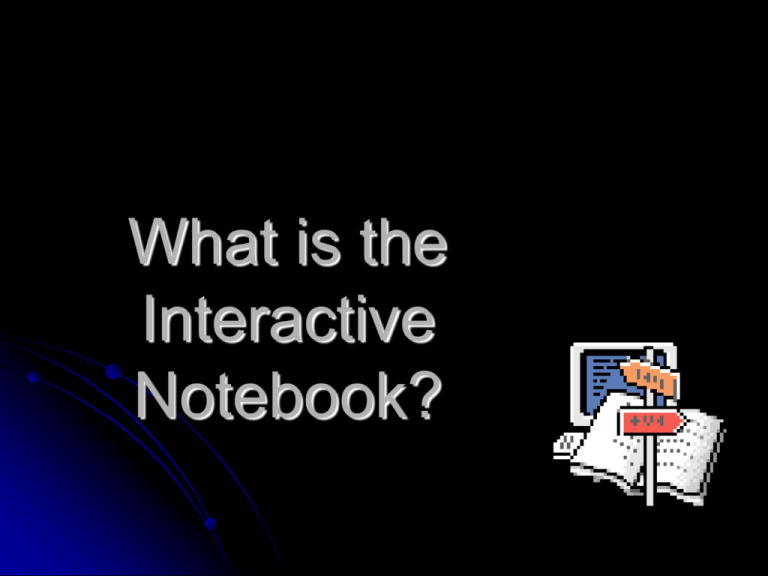
What is the Interactive Notebook? Interactive Notebook Allows students to record information about history in an engaging way. They can… Transform written concepts into visuals Find main points of a political cartoon Organize historical events into a topical map Draw whatever illustration that makes sense to them Personalize the historic event Interactive Notebooks… Organize the student Help students sequence assignments Encourage pride in student work Facilitate cooperative interaction Appeal to multiple intelligences Provide opportunities to spiral instruction and facilitate learning Many student notebooks are drab repositories of information filled with uninspired, unconnected, and poorly understood ideas. Interactive Notebooks… Are colorful with diagrams, bullets and arrows Are in pencil and crayon Are presented in a unique, personal style Key ideas are underlined in color or highlighted Venn diagrams show relationships Cartoon sketches show people and events Timelines illustrate chronology Arrows show relationships Interactive Notebooks Require Recording history in an engaging way Use several types of writing and innovative graphic techniques to record history Force students to process these ideas They might transform written concepts into visuals Find the main idea of a political cartoon Use a graphic organizer to place historic events in a relational way Encourage the use of critical thinking and be more creative, independent thinkers What students need… Notebook, pencil, colored markers or crayons, highlighters They might use scissors, glue stick, and more colored pens Interactive Notebooks encourage Notes to be organized Logically ordered Information processing in the student’s brain Better understanding of history Interactive Notebook Output Input On the right side record your notes in normal way—teacher input side On the left side—student output side Translate your note material into a Drawing Graphic organizer Mind map Picture sentence Right Side/Left Side Left Side Students Process New Ideas Reorganize new info in creative formats Express opinions and feelings Explore new ideas Creative Side Right Side Teacher Provides New Info Class Notes Discussion Notes Reading Notes Handouts with new info Structured Side Right Side Opportunity for teacher to model for students how to think graphically Teacher organizes the common set of information that all students must know Left Side Requires students to process information Requires students to actively do something with the information to internalize it Gives students permission to be playful, imaginative, experimental, creative Allows various learning styles to process information Sample What can go in it???? Anything Drawings Poetry Raps Graphic organizers Cartoons Maps Charts and graphs Invitations Letters from famous people Let your imagination go!!! Be creative! Why Interactive Notebooks? Students use both their visual and linguistic intelligences Approach understanding in many ways Use many types of writing and graphic techniques Each student can select their best medium to explore and learn new content Why Interactive Notebooks? Note taking becomes an active process Students are invited to take notes—it’s fun! Students will read their notes—they have to in order to process for the left side Students will be working with (rehearsing) the information which facilitates learning Students will actively be involved with history Why Interactive Notebooks? Notebooks help students to systematically organize as they learn Organization is key to the notebook Concepts like Table of Contents Numbering pages Recording SOL numbers Topic headings They stress the organization of a book Why Interactive Notebooks? Notebooks become a portfolio of individual learning These are personal Creative They record student growth in history They show progress They serve as a chronological record of the learning and are great for review Examples from History Alive! Mosaic Poem Historical Caricature Pictowords Silhouette—Mind Notes Annotated Slides Annotated Illustrations Provocative Statements--opinions T-charts Tables Illustrated Outlines Illustrated Dictionaries Facial Expressions Report Cards Postcards Wheels Flow Charts Eulogies Illustrated Timelines Perspectives Charts and Graphs Mosaics CD Covers Posters Book Covers Collages Annotated Maps Advertisements Invitations Cartoons or Comic Strips Historical Journals Sources History Alive. Interactive Notebook. Palo Alto: Teachers’ Curriculum Press. 1999. History Alive. Six Powerful Teaching Strategies. Palo Alto: Teachers’ Curriculum Press. 1999. History Alive Website. http://www.historyalive.com
